What Happens to Your Body When You Eat Berries Every Day
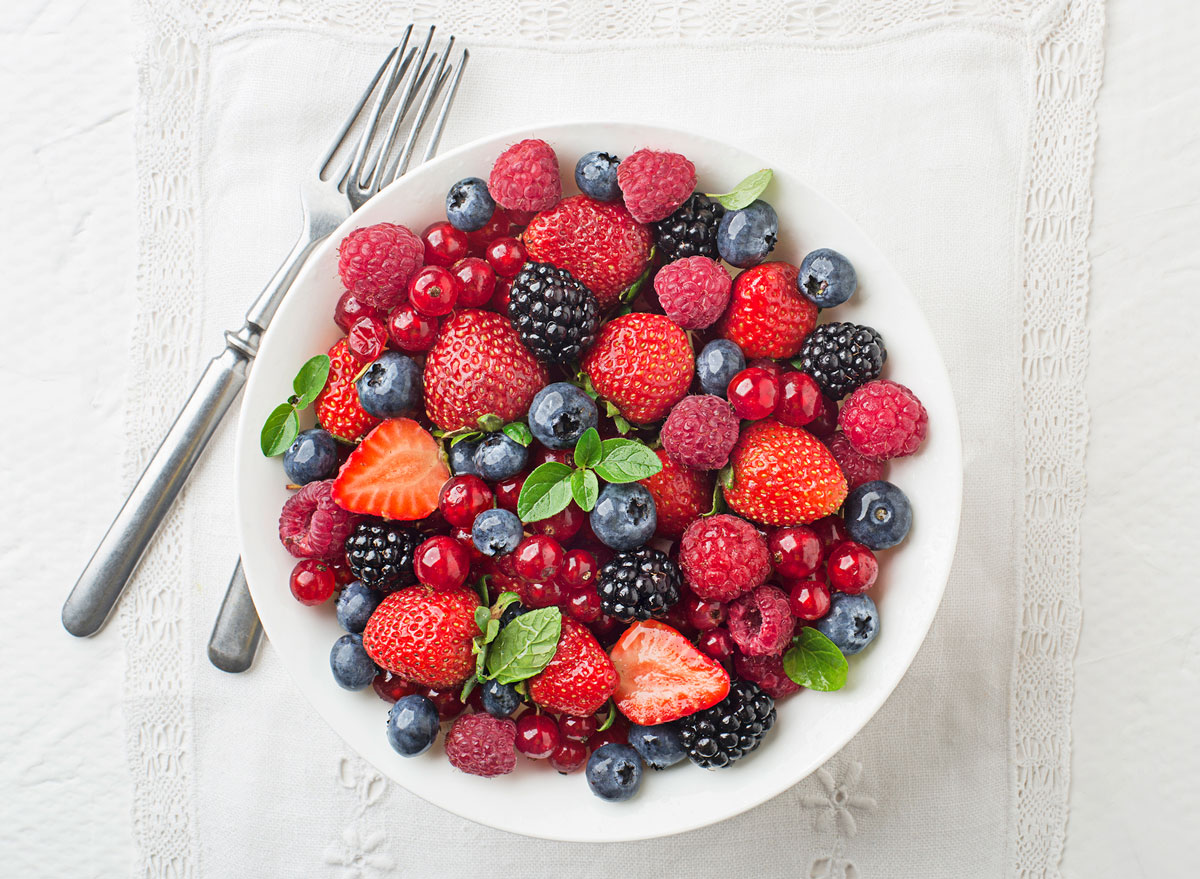
Berries are one of the healthiest plant-based foods you can eat. Their bright red, blue-black, purple, and other colorful hues are a sign of the myriad antioxidants and flavonoids found in berries that contribute to their health benefits. These fruits top the charts in terms of their overall nutritional profile, antioxidant capabilities, and their ability to help reduce the risk for chronic disease.
In general, most common berries, including strawberries, blueberries, blackberries, raspberries, and cranberries, are rich in essential nutrients like vitamin C, folic acid, fiber, and potassium. Berries like acai, elderberry, and goji are also nutrient-packed and provide similar health and nutritional benefits. Reams of research going back decades show that berries help reduce the risk of heart disease, certain types of cancer and dementia, and type 2 diabetes, and they help control systemic inflammation that is linked to myriad health conditions.
You may think of fresh berries as a summertime treat, but they're available year-round. If you're looking for a budget-friendly way to incorporate more berries into your meals and snacks, look for frozen berries at your supermarket. They're a great option for smoothies, muffins, pancakes, cobblers, frozen desserts, parfaits, and more.
Read on to discover all the amazing benefits you'll get when you eat berries every day, and for more, don't miss 20 Best-Ever Weight Loss Smoothies.
The quality of your diet will improve.

Berries are among one of the most nutrient-rich, plant-based foods you can include in your diet. Cranberries, blueberries, blackberries, raspberries, and strawberries are low in calories (about 60-80 calories per cup of fresh berries) and are packed with numerous vitamins, minerals, and other bioactive compounds essential for health and disease prevention. Some of the most notable nutrients in berries include fiber, vitamin C, folic acid, potassium, manganese, vitamin K, and polyphenols including anthocyanins and tannins. Another benefit is that you get all that great nutrition in relatively few calories. A serving of berries (1 cup raw) is about 60-80 calories, depending upon the type of berry.
Your brain may stay sharper for longer.

Decades' worth of data show that berries have the capacity to help maintain our memory and cognitive function as we age. Berries are one of the core food components of the MIND Diet, the diet that has been shown to reduce the risk for neurological declines. The MIND diet recommends berries at least twice a week. Berries are thought to improve brain health by improving the vascular function of the brain and reducing inflammation. A review article published in Neural Regeneration Research reported that berries offer neuroprotection through numerous biological pathways.
Your blood sugar levels will moderate.
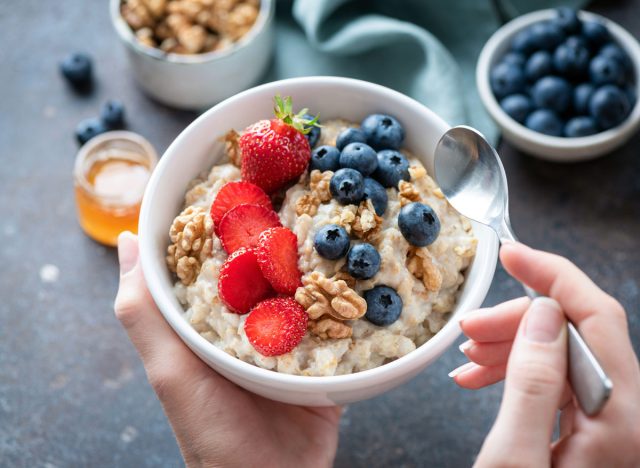
Thanks to the fiber, and other beneficial bioactive compounds present in berries, studies show that they can help stabilize blood sugar and insulin levels, to help avoid the highs and lows that are known to increase the risk for metabolic syndrome and type 2 diabetes. For example, one study found that when berries are enjoyed as part of a meal or snack with other carbohydrates can help temper both blood sugar and insulin levels as well as ameliorate postprandial hyperglycemia and hyperinsulinemia in overweight or obese adults with insulin resistance.
One study reported in Food and Function revealed that blueberries helped regulate blood sugar levels and reduced the blood sugar response after consuming carbohydrates, among healthy, young study participants.
You may live longer.
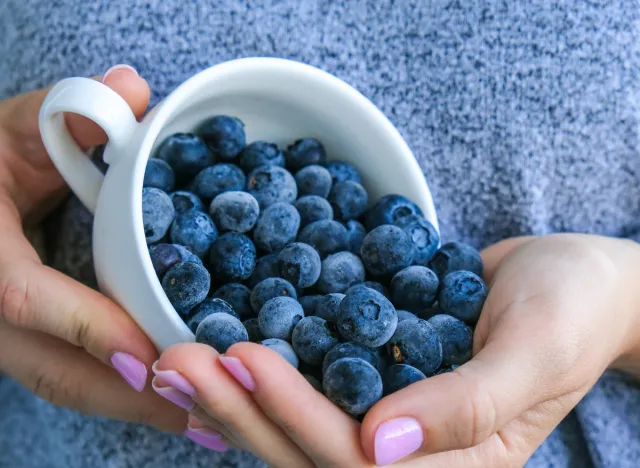
Another study by The Harvard School of Public Health researchers published in BMC Medicine examined the intake of more flavonoids among more than 100,000 study participants and noted that those who consumed the most flavonoids lived longer. Blueberries were one of the most highly correlated foods to a reduced risk of dying. The researchers noted a 5% lower risk of death for every 3.5 servings per week. The authors suggest that increasing flavonoid-rich food in one's diet, such as blueberries and other berries, can help you add more years to your life.
You'll likely lose lbs.
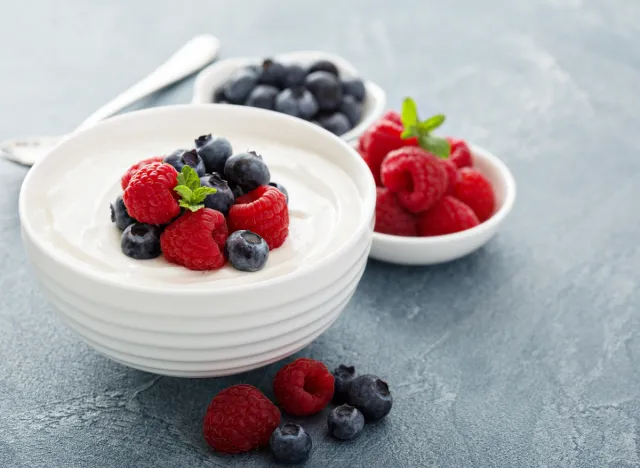
Berries are a great option for anyone trying to slim down and tone up. Low in calories and high in fiber, berries are a great choice for anyone trying to lose weight or maintain a healthy weight. A cup of fresh berries has about 60-80 calories and 4 or more grams of fiber. Raspberries, for instance, pack in 8 grams of fiber. The high fiber counts in berries will help keep you satisfied because the fiber slows digestion and moderates blood sugar levels. Compared to other fruits, berries are also lower in natural sugars.
One study conducted by The Harvard School of Public Health researchers and reported in BMJ found that adults whose diets had the most dietary flavonoids (like those found in berries) were less likely to gain weight over the 20+ year study period. The authors concluded that diets rich in flavonoids may contribute to weight maintenance and help prevent weight gain among adults.
You'll reduce your risk for heart disease.
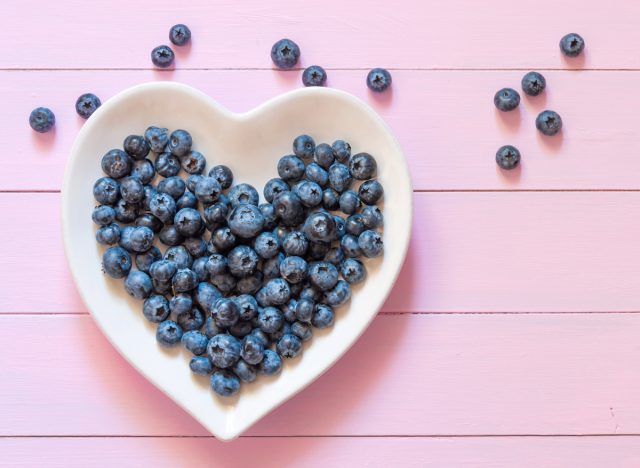
Berries are considered heart-healthy due to their beneficial flavonoids that have been shown in studies to help reduce the risk of developing heart disease. Scientists believe that antioxidant concentration and improvements in blood vessel function are the two main pathways by which these powerful superfoods reduce one's risk of heart disease. In a review article of 50 published studies published in Frontiers in Nutrition, the authors concluded that diets rich in anthocyanin-rich berries significantly reduced the risk of coronary heart disease, cardiovascular disease, and deaths from cardiovascular disease. Another study published in Molecular Nutrition & Food Research reported that among animals with diabetes, those fed a berry supplement experienced improved blood vessel function.
Your eyes will be healthier.
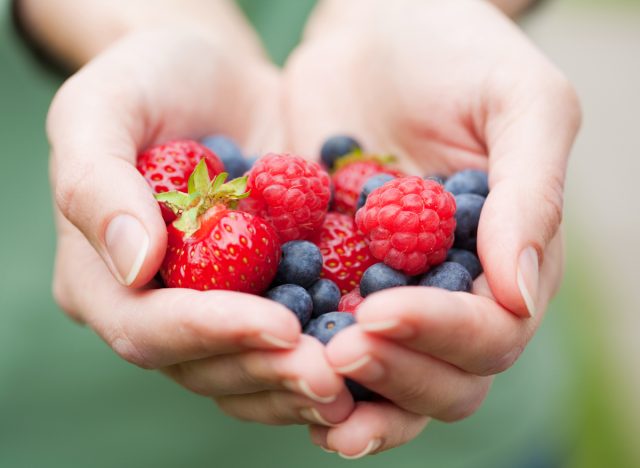
Berries provide anti-inflammatory benefits that can help protect your eyes from damage from UV light. One study published in the journal Nutrients found that goji berries increased macular pigment density, which is a biomarker that is linked to reduced risk for age-related macular degeneration, the leading cause of blindness among older adults. Goji berries are rich in zeaxanthin, one of the main carotenoids present in the macula which helps combat oxidative stress from UV light. Traditional berries can also help protect your eyesight as they all provide vitamin C and other antioxidants that help protect your eyes as you age.
- Source: https://journals.lww.com/nrronline/fulltext/2014/09160/neuroprotective_effects_of_berry_fruits_on.13.aspx
- Source: https://pubmed.ncbi.nlm.nih.gov/28752872/
- Source: https://pubmed.ncbi.nlm.nih.gov/37173745/
- Source: https://pubmed.ncbi.nlm.nih.gov/26823518/
- Source: https://www.frontiersin.org/articles/10.3389/fnut.2021.747884/full
- Source: https://onlinelibrary.wiley.com/doi/10.1002/mnfr.202270021
- Source: https://www.ncbi.nlm.nih.gov/pmc/articles/PMC8708314/









